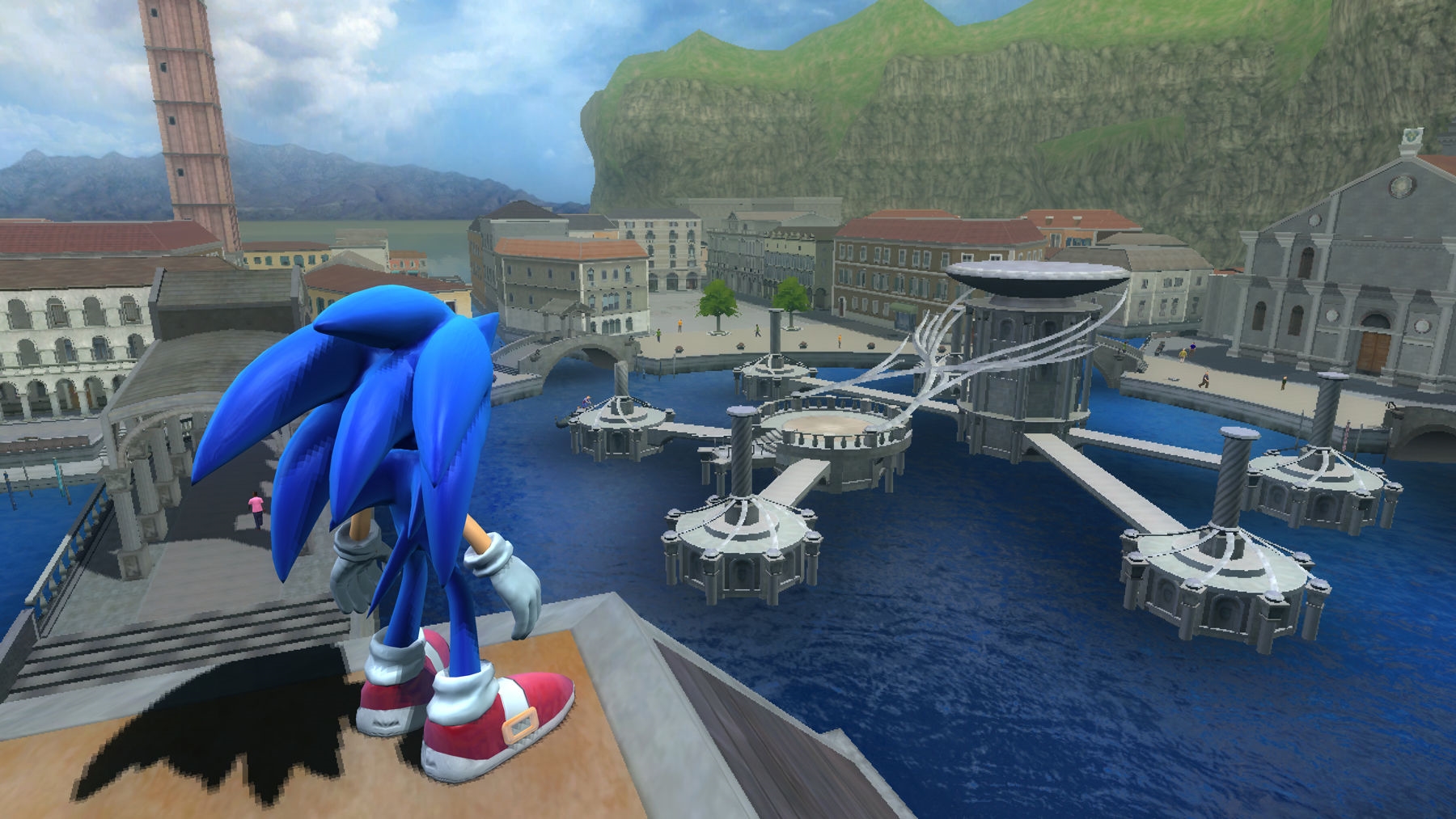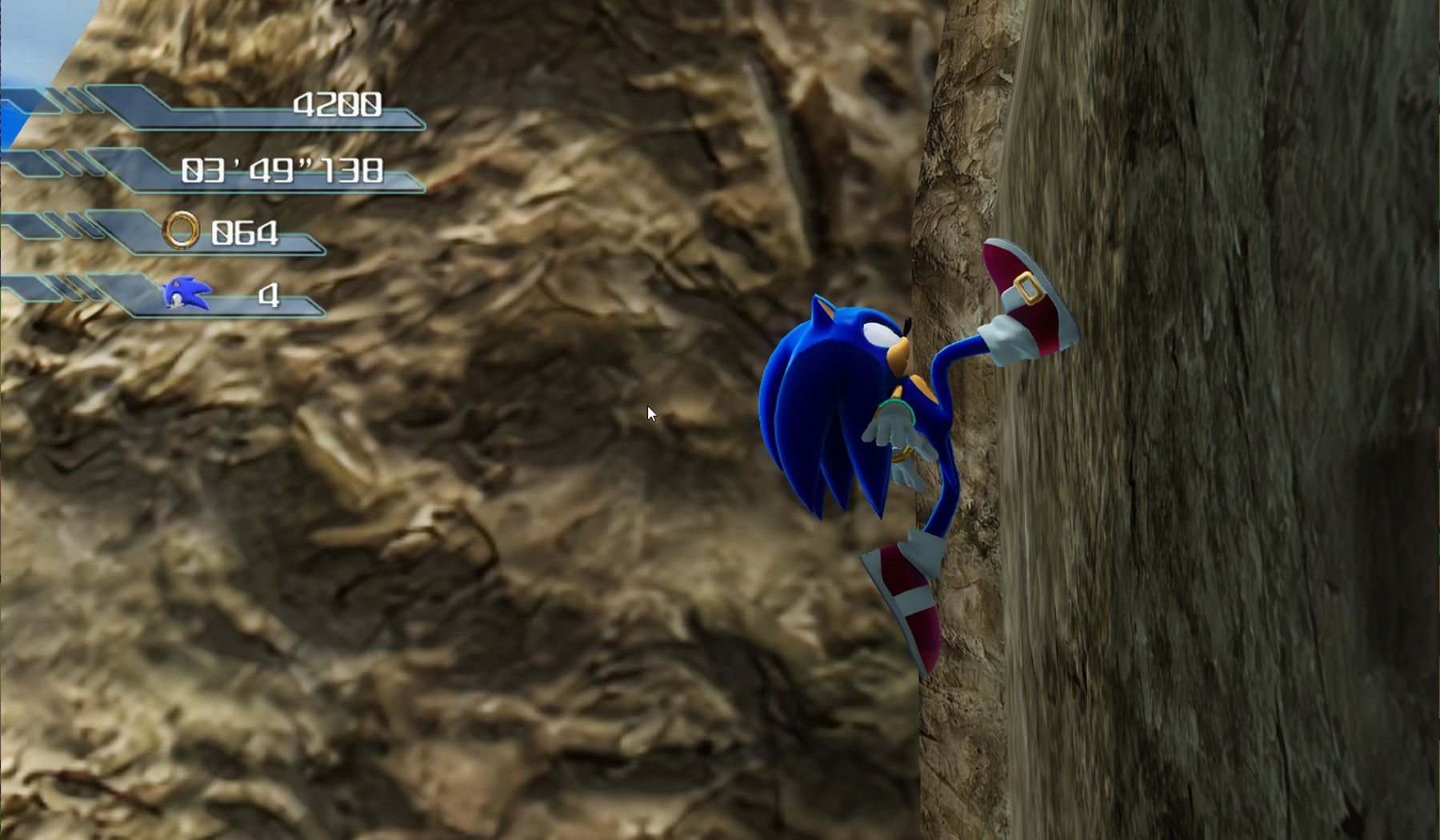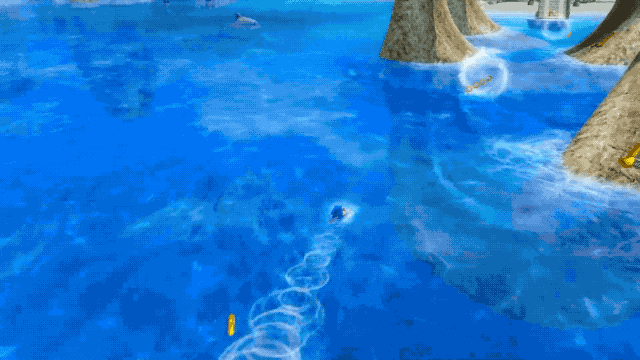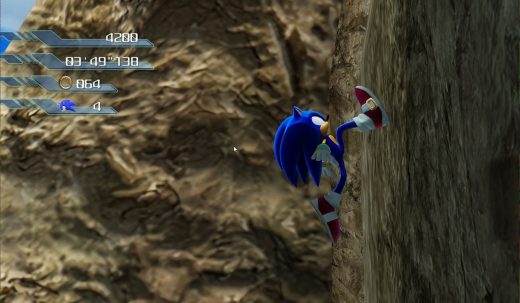One fan’s struggle to fix the worst game in Sonic history
But the game was a massive flop. Critics slammed the ambitious but poorly written story, which combined time travel, all-powerful gods and a post-apocalyptic future filled with nothing but fire and abandoned skyscrapers. They hated the finicky controls, too, as well as the uncooperative camera system, agonizingly long load times and glitch-riddled levels. Patient players were rewarded with a passable-at-best blend of platforming and action as well as open-world zones that were barren and seemingly half finished.

Oh, and it was also the game that had a universally hated kiss scene between Sonic and a human princess.
Many consider Sonic 06 to be the lowest point in the franchise. The PS3 version has a 43-percent rating on the reviews aggregation site Metacritic, which is lower than Sonic Forces, Sonic & the Black Knight and Shadow the Hedgehog — the hugely divisive game where Sega’s black-and-red antihero skated around with sub-machine guns and said “damn” a lot. Most Sonic fans want to forget the game was ever released. But not Ian Moris, a developer known online by his handle ChaosX. Instead of condemning and ridiculing the title, he’s one of a select few trying to fix it.
Moris has packed some fan-centric extras into the options, too. A TGS Sonic toggle, for instance, revives the character animations that were shown in an early Tokyo Game Show demo. You can also switch Sonic’s jump ball to the cleaner sphere seen in Sonic Adventure, alternate between a straight and curved jump-dash and add a lock-on reticule for homing attacks. “I’ve seen a lot of people say they’ve seen the homing attack do ‘things out of this world’ [in the original game] and they are kinda right,” he said. “The homing attack radius can be somewhat of a pain in Sonic games. A lock-on makes it easier to deal with the uncertainty.”
P-06 will even let you change various UI elements as well as the appearance of dialog boxes, loading screens and the pause menu.
The remake is being built for PC, so, of course, there are graphical settings. Lots and lots of graphical settings. You can adjust draw distance, texture quality, anti-aliasing, anisotropic filtering, color grading, bloom, volumetric lighting and countless other visual options to your liking. None of these settings will radically change the game — P-06 can’t and will never match Death Stranding for visual fidelity — but they make a difference if you own a high-end PC.
It’s a phenomenal achievement. Moris isn’t the first person to attempt a Sonic 06 remake, though. Developers Gistix and Mefiresu led a group that presented two demos, covering the game’s Dusty Desert and Crisis City levels, at the Sonic Amateur Games Expo (SAGE) in 2017 and 2018. A group is still working on the project, though without Gistix’s leadership and at a slower pace than before, according to Moris. “The steam [around the remake] has noticeably died down, unfortunately,” he said.
With five playable stages, Moris appears to have made the most progress among the Sonic fan community. It’s a remarkable feat that’s made even more remarkable by one simple fact: Moris has never played Sonic 06.
The 20-year-old developer grew up in Argentina, where “gaming is not that commonplace.” He received a Sega Genesis as a toddler, though, and quickly fell in love with the original Sonic the Hedgehog. Moris later acquired Sonic the Hedgehog 2, which he thought was fun but “incomplete” and “broken in places.” (He later found out that his copy was an early prototype of the game.) The youngster then moved on to Sonic the Hedgehog 3, which he thought was the “ultimate [Sonic] experience” and its direct sequel, Sonic & Knuckles.
Around 2010, four years after the PlayStation 3 was released in Japan, Moris was given a PlayStation 2. The pre-adolescent tore into the system’s deep library, which included Sonic titles such as the Gems Collection — a retro compilation that included Sonic CD, Sonic the Fighters and Sonic R — and racing spin-off Sonic Riders. “I was just madly addicted to Sonic the Hedgehog and gaming overall by that point,” he said.
A couple of years later, Moris got his first PC. While low end, it allowed him to experience a slice of PC gaming, including the Sonic Adventure titles, which started as Dreamcast exclusives but were later ported to the Nintendo Gamecube, PC and, in the case of Sonic Adventure 2, PlayStation 3 and Xbox 360. The platform also exposed Moris to a variety of retro games that weren’t available for the Sega Genesis or PlayStation 2. “I discovered new worlds everywhere I went,” he said.
“I was just madly addicted to Sonic the Hedgehog.”
He would later upgrade his PC and play some Sonic games that were released during the PlayStation 3 and Xbox 360 era, including the well-received Sonic Generations and excellent kart racer Sonic & Sega All-Stars Racing. But there was one game that Moris could never play: Sonic 06. The adventure-platformer had come out years before, but the Argentinian had only discovered it after gaining access to the internet. “Its advertisements, atmosphere, tone and sound, CGI, graphics… everything resonated with me,” he said. “It grabbed my attention like crazy.”
At first, Moris didn’t know that the game was only available for the PlayStation 3 and Xbox 360. He visited local game stores and asked if they had any PlayStation 2 copies. “I was bummed out [when I] found out it was either out of stock or not available for PS2,” he said. He was aware that the game had reviewed poorly and upset parts of the Sonic community. “I didn’t care really,” he said. “I loved what I saw and binge-watched videos of the game, learning about its story and development. It just became the game I’ve been most obsessed with ever.”
The PC wasn’t just a way for Moris to discover and play video games, though. Through the internet, he also discovered game development and the small but passionate communities that mod existing titles or create fangames — unofficial titles based on existing characters and franchises — from scratch. Moris started a couple of projects with Blitz Sonic, a fan-made engine based on Blitz 3D, an old but easy-to-learn programming language derived from BASIC and created by Blitz Research. These included the open-world platformer Sonic Dash and Sonic Blue Runner, his own take on the Blitz3D engine. “I was very young and very new to everything,” he said. “I dread those memories [of] the early years.”
Moris slowly abandoned these projects and switched to Unity in 2014. After a brief engine experiment, he tried to make an HD version of Sonic Unleashed — a 2008 title that transformed Sonic into a ‘Werehog’ at night — called World Adventure Project. Like Sonic 06, it was a game that had never been released on PC and, as a consequence, Moris had no experience playing. “I was committed to [doing] it and full of energy,” he explained. According to the developer, he abandoned this project after finding “better things to do on Unity.”
One of those “things,” clearly, was P-06. Moris took on the project because he’d admired the game for so many years and never had a chance to play it. “Since I had the tools to make games, why not take on the challenge?” he explained. “If I can’t play the game, then I’ll experience it through making a recreation of it.”
Moris also saw the project as an opportunity to fix some of Sonic 06‘s glaring faults and add unused material hidden in the game’s code. “This was a chance to make use of it all,” he said. “I could add my own touches to the game and give it a second chance.”
In April 2017, Moris uploaded his first P-06 “dev clip” to YouTube. It was supposed to be a private post, but he accidentally set the video to public and only realized his mistake an hour later. In the description, he emphasized that it was a separate project to the one led by Gistix but could be considered a “parallel” attempt at remaking Sonic 06 in Unity.
According to Moris, only “very small snippets of pseudo-code” can be accessed or seen in Sonic 06‘s files. These digital tidbits include values, formulas and parameters for core character attributes, such as running speed and jumping height. They also provide some insight into the game’s levels, including objects and enemies. “But that is a very small fragment of what makes the game,” Moris said.
The closed-off nature of Sonic 06‘s programming isn’t unusual. Most games, Moris explained, have scripts and code that are inaccessible unless you’re the owner or creator of the game. Thankfully, some knowledgeable users online have managed to crack open Sonic 06 files that explain the three-dimensional placement and rotation of each object in the level. It’s often not obvious, though, what these values relate to and the additional code that’s required to make them work. “A lot of the time, whether an object works correctly or not, compared to the original game, depends on if I manage to code it to work exactly, or at least similarly to its original counterpart,” he explained.
With those small code snippets, as well as minimal models, textures, videos and sounds, Moris started to piece the original game back together. At first, he simply tried to recreate each level while hiding or removing the most obvious “broken stuff.”
“I have to go through every spring, jump ramp and launcher.”
The developer had a good sense of how the game looked and played just by watching and analyzing YouTube videos. He also created a folder that now has “gigabytes” of reference material, including beta footage and fan-recorded gameplay. “It wasn’t too hard to figure out how it controlled originally,” he said. A larger problem was making sure every piece of the environment behaved properly. “The way [the original] Sonic 06 controls objects is very unpredictable,” he explained. “I have to go through every spring, jump ramp and launcher and see if they even make the character land where they’re supposed to.”
There was also a ton of assets that Moris had to create himself, including textures, character animations, typefaces and “most of the shaders,” in the game. He used some asset packs from the Unity store and, where possible, tried to improve the ones that shipped with the original game.

Such a large project required some collaborators. In the original game, for instance, Sonic is portrayed using six different character model files. These cover Sonic’s complete body, an alternate body with gem shoes, Super Sonic’s body and then three faces used in standard gameplay, cutscenes and while playing as Super Sonic. A Scottish modder called Gotta Play Fast used Autodesk 3ds Max, a professional application for 3D modeling and animation, to combine these pieces in a way that would be easier to use inside Unity. After “quite a few tries,” Gotta Play Fast told Engadget he ended up with five complete meshes for the game: Sonic and Super Sonic, as well as standard, gem and Super Sonic’s gem shoes.
Another modder called Beatz helped with textures, increasing the resolution of the original Sonic 06 assets, some model work that included rigging and collision fixes and eventual beta testing. Daguar, meanwhile, helped with beta testing, researching the original game and creating a loading screen template that emulated the E3 2006 demo. The latest P-06 read-me file also credits Volcano the Bat for helping with assets and various reverse engineering challenges and gives special thanks to users Wiz Genesis, Hero, Sajid, LuRodSil, HyperPolygon64, KnuxFan24, Thomas James Baker and BrianuuuSonic.
Many of these users describe their contributions as “minor,” though. “Especially considering that the actual development and coding is currently only being made by one person, ChaosX,” Daguar said. “He’s really talented and hard-working and I’m sure he’s going to have a bright future in game development.” Moris added: “Everything has to go through me in the end, the only owner of the project files, putting everything together.”

The first P-06 demo, which only contained the Wave Ocean and Kingdom Valley stages, was released last April. The announcement video has roughly 150,000 views on YouTube and, more importantly, a deluge of comments praising its visuals and bug fixes. “You are a god,” one user wrote. “This looks gorgeous,” another viewer named The Bone said. “This dude is literally fixing a game that was supposed to be the best Sonic game ever, all while adding extras to the game to make it better,” a user called Batbudd commented. “Bravo.”
“It’s been two years working full-time on this project. It’s about time for [me to have] some vacation.”
The demo was followed up with a “v2.5” bug fix update last month. In that video, Moris revealed that he would be taking a short break from P-06 so he can focus on other passions and get some fresh air. “It’s been two years working full-time on this project, and it’s about time for some vacation,” the developer said.
The P-06 demos are further evidence that Sonic isn’t finished as a pop culture icon. The blue blur can’t compete with Mario in the 3D-platformer genre, but he’s found some success in smaller projects like the wonderful Sonic Mania and the enjoyable if hardly ambitious Mario & Sonic at the Olympic Games Tokyo 2020. A computer-animated version of the hedgehog is also starring in a movie next year alongside James Marsden (X-Men) and Jim Carrey (The Mask). Fans hated his appearance in the first teaser — the human teeth and strangely muscular legs were a bit much — and pressured Paramount Pictures to change it. His redesign, shown off in a “new official trailer” last month, was a massive improvement.
Unsurprisingly, Moris doesn’t know when P-06 will be finished. Some demos take longer than others to complete, and he can’t predict when he’ll be “happy” with the game or how long it’ll take to eradicate every conceivable bug. “I have no idea when it will be finished,” he admitted. “A wild guess would probably be in two years, but I’m very unsure about that.”
Moris has modest expectations for the project, too. He knows that many parts of Sonic 06 — including its reputation and impact on the larger franchise — can’t be changed or fixed. The developer also expects P-06 to remain an “underground” project for Sonic fans and those who can appreciate what Sega was trying to achieve with the original release. “Hopefully one day this game can be liked as much as any other Sonic game,” Moris said. At the very least, P-06 will broaden access to a game that — while generally disliked — is an important part of Sonic’s history and necessary to understanding his place in the industry today.
Sonic 06 has never been officially ported or released on PC. That means the only way to play the game is with a PlayStation 3, Xbox 360 or Xbox One via backwards compatibility. With ‘P-06,’ Moris wants to remake and rebuild the unloved platformer inside Unity, a popular engine that supports a variety of platforms, including PC. Along the way, the developer wants to improve the game’s visuals, fix its worst bugs and tweak some of the gameplay fundamentals that made it so difficult and unenjoyable to play at launch.
To date, Moris has released two demos that are free to download. The most recent version, released last month, offers five stages or “acts” from Sonic’s story line. These include Wave Ocean, an early level that lets you briefly play as Tails; Dusty Desert, a slower-paced zone where Sonic carries Princess Elise; Flame Core, a notoriously dark area with a playable Knuckles section and Kingdom Valley, which momentarily swaps Sonic for the psychic Silver. Some acts also include Super-Speed Stages — a final section that propels the blue blur forward automatically at a frighteningly fast pace.
The most obvious change is the load times. The original Sonic 06 made players wait anywhere between 10 and 60 seconds to access the next portion of the game. P-06, meanwhile, keeps these interstitials to three seconds or less. If you own a half-decent gaming PC, they’ll often appear and vanish before you have a chance to read the tips or mission summary on-screen.
Many characters have entirely new moves.
The levels are more vibrant and detailed than the original game, too. The tropical water in Wave Ocean, for instance, is a brighter blue and has more distinct, tightly packed waves lapping against the sandy shores. The hedgehogs are livelier — Silver’s head quills sway and glow brighter as he’s powering up a psychic attack — and move faster than they did in the official release. Sonic has more momentum, and Silver, who used to be painfully slow, has a faster glide move to quickly navigate each level.
Many of the characters also have entirely new moves. During a Super-Speed Stage, for instance, Sonic can now perform a quick bounce and brake to avoid catastrophe. Silver has been given a long-range Psychic Shot, while Tails and Knuckles can perform attacks inspired by their Sonic Adventure move-sets.
(50)


